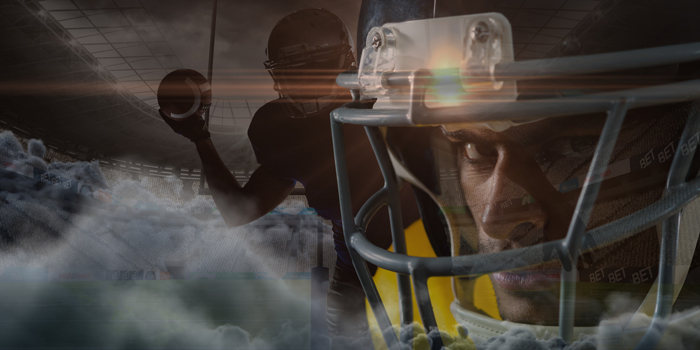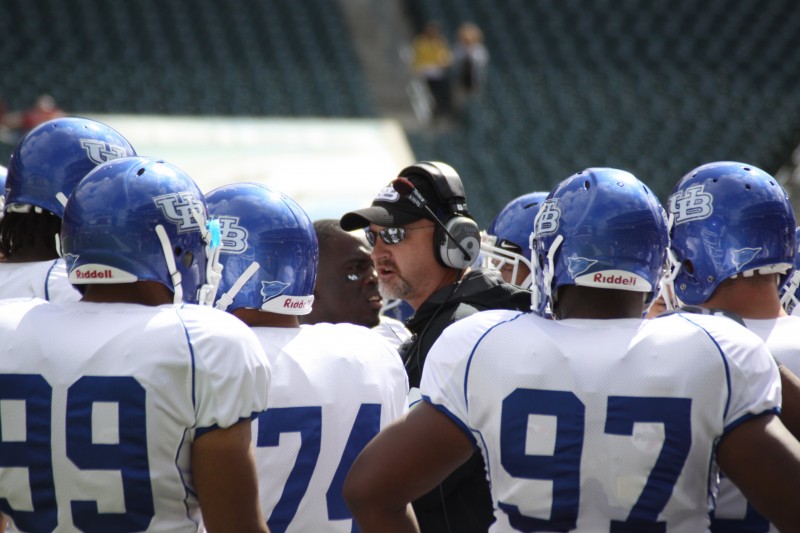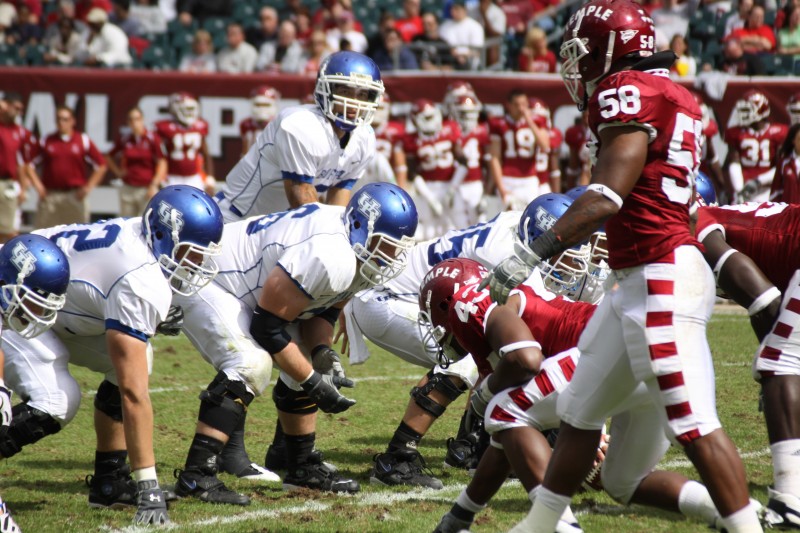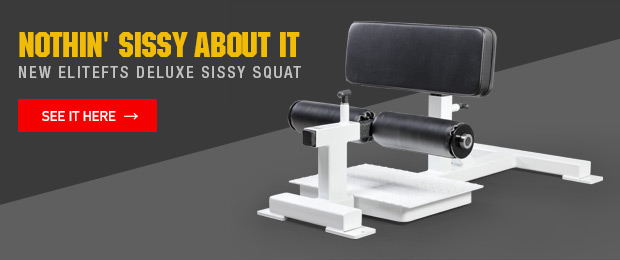
Seeing is believing. Our science-driven society mandates that empirical evidence be collected, analyzed, and utilized. Society tells us that our personal experiences and observations can be trusted and relied upon to draw rational conclusions. But they can’t.
Indian folklore examines a scenario in which a group of blind men decides to conduct their own observational experiment. The men have heard about an animal in town that none of them are the slightest bit familiar with: an elephant. They decide that they will use their sense of touch (their most reliable form of empirical data collection) to discover what this animal is like. When they arrive at the elephant, they gather around and each man sticks out a hand to feel the animal and gather information.
LISTEN: The Jacked Drifter with Dave Tate and Mark Valenti
The men regroup to confer about their findings and things get heated. One man says an elephant is similar to a thick snake. Another says it is built like a tree trunk. The next says it feels like a sharp spear. Still, another says it is nothing more than a big wall. They can’t believe what they’re hearing. The men know what they felt. They are positive that the snake-like creature could never be described as a wall or a sharp spear. They come to the only conclusion they deem logical: their peers are falsifying data. They cannot tolerate such unethical standards to taint their study, so they become hostile toward their counterparts.
Finally, a man with full eyesight and previous experience with elephants comes to the rescue. He explains that an elephant is a very large animal with many different parts. Each man had their hand on a different part (the trunk, the leg, the tusk, and the side, respectively). Each man had a different perspective.
Our individual perspectives are incredibly important, but they do not tell the whole story. I repeat: Our individual perspectives are incredibly important, but they do not tell the whole story. (While this article will remain rooted in athletics, it is necessary to note that our global atmosphere would look quite different if we all adopted this ideology.)

Richard Kane © 123rf.com
In no place is this more evident than on an athletic team. The head coach, assistant coaches, strength coaches, athletic trainers, physical therapists, equipment personnel, and league officials all have distinctly different vantage points on the same subject matter. However, somewhere along the lines, one of the most critical perspectives gets lost in the shuffle: the players'.
Excluding the professional level (and emphasizing the collegiate level), the athletic world has developed a unique dynamic, in which the most notable and valuable individuals are stripped of all bargaining chips and have zero say in day-to-day and overall system operations. Athletes are told what to do, what to wear, where to be, and how it should be done for nearly the entirety of their waking moments.
During my senior year, I had to end my playing career only three games into the season. For the remainder of the season, I would walk out on the field in my jersey for the coin toss, then throw on a headset in the booth or on the sidelines and act as an extra coach. It was during this time period that I realized how much perspective matters. I discovered how seeing things as an active member on the field is entirely different from the view you get as an engaged viewer on the outside. From the sidelines, you cannot fully grasp the physical, mental, and emotional toll that the game/practice takes on the players. The most alarming fact was how quickly I forgot what it felt like. In only a few short weeks, I had almost completely lost the ability to empathize with what my teammates were going through.
As I continue my transition from player to coach while also studying to become a physical therapist, I believe that I am in a unique position to step back and observe the situation from a much broader perspective. I write this not as a demand for systems overhaul, but as a plea to coaches and sports medicine personnel everywhere to step back into the cleats. I write this as a reminder to my future self to remember what my playing days actually felt like, not what they appeared to be from the outside. I write this for those in power to always remember to speak up for those without a voice, even when you may not see what they see. So with tusk in one hand and trunk in the other, I write...
1. Our Trust in You is a Necessary (Not Optional) Requisite for Us to Listen to You
It is important to understand that there are global behavioral differences between generations. You can sit there and post on Facebook about how awful millennials are, deluding yourself into believing that your incoherent tirades will somehow produce attitude overhauls on a national scale. Or you can accept that this generation is different and try to understand not only why that is, but also how to best utilize this to your advantage.
On the surface, it may seem as if millennials have an innate disdain for authority and the traditional hierarchical structure. If you dig deeper though, you’ll find an endless pile full of examples of the younger generation not only respecting and obeying superiors but doing so with effort and vigor unmatched by the older generations. How is this possible? Easy:
Our issues are not with being led, but with being bossed.
RELATED: The Contempt for Millennials: Reconsidering a Generational Divide
This is not merely a matter of trivial semantics. Leaders and bosses are intrinsically different people driven by entirely different motives. Leaders care about their followers. Bosses care about their products.
Authority manifests itself in a variety of ways, but the most rewarding form is that of authentic leadership. There is an insurmountable amount of truth in the old adage, “They don’t care how much you know until they know how much you care.”
I cannot emphasize enough how much your degree/certification/coaching history does not matter if you do not genuinely love your athletes. If you don’t care about us first and foremost as human beings, we will never trust you as a coach. If we never trust you, we won’t listen to you. If we won’t listen to you, you’ll never make an impact.
It doesn’t take much to transform from a boss to a leader; just be a decent human being. Ask about our day and actually listen and respond to our answers. Find out things about us besides our 40 times and positional tendencies. Praise us for what we do right more than you condemn us for what we do wrong. Take the time to show us that we’re appreciated and we’ll do the same for you.
Always remember that leaders care about their followers, while bosses care about their product. If you care more about the on-field success of your team than you do the personal well-being of your athletes, then both will suffer.

Richard Kane © 123rf.com
2. Us “Questioning” You is Not Out of Disrespect, But Genuine Curiosity
Our inquisitive nature is exactly that; natural. We have never known a world without Google. The answer to any question we could ever conceive is available to us instantaneously. I can actually tell you that researches from Cornell University have estimated that a woodchuck would chuck 700 pounds of wood, if he could chuck wood, of course.
The information age of the internet has spoiled us. We want to know EVERYTHING. We will question pretty much every word that comes out of your mouth. This perennial skepticism, however, will absolutely skyrocket the quality of all professions that come into contact with it. If you don’t know your stuff and know it well, you won’t last. You can’t simply hide behind the good ol’ boys’ mantra of “because I said so” anymore. We need to hear a rationale for every drill that we’re doing, every modality of treatment that you employ, and every scheme that you draw up. If you can’t answer our questions intelligently, we will figure out that you’re a fraud and you will be ousted.
If that concept bothers you, some deep introspection is necessary. People who aren’t qualified enough to explain their reasoning for why they do what they do should not have that job.
If you went to the doctors and asked them to explain why they prescribed a certain medicine would you expect them to a.) Provide a detailed response utilizing terminology that you can understand; or b.) say, “Because that’s how we’ve always done it”?
I think we all can agree that you would be furious if you got the second answer. But for some reason, we experience that every single day in the athletic realm. Athletes deserve to know why we’re doing what we do and it is your ethical duty as a professional to be able to accurately articulate that. (Also, saying the words “mental toughness” is not a proper justification for doing stupid stuff.)
ANOTHER PERSPECTIVE: 10 Ways to Develop Mental Toughness in Young Athletes
Don’t get offended when we come to you with a ridiculous amount of questions; it’s who we are. Our inquiries should not be mistaken for interrogations. Nor should they be evaluated as an attempt to undermine your authority. They’re just questions, so answer them.
3. Your Empathy is Everything
Maybe it’s the naive optimist in me, but I have a difficult time finding any appreciation for Murphy’s Law. However, I will throw my support behind a (strongly) modified version of this phenomenon: “Anything that can go right won’t always go right.”
Throughout the world, athletes are revered and admired on a level unrivaled by other professions. This mountainous pedestal on which elite athletes are placed elicits an unrelenting craving within the younger generations to carve their seat on the peak. We are swarmed with constant reminders about how important the sporting world is. Media coverage is as extensive for LeBron James as it is for every president of the United States. Our family gatherings are centered around games of volleyball and wiffle ball. Conversations with our friends nearly always gravitate back to fantasy football or AB/Julio and LeBron/MJ debates. Even small talk with complete strangers focuses on either the seasonal weather changes or whether or not Tom Brady will be able to keep playing like this for the next three seasons. Our daily lives are filled with drops of gasoline being sprinkled on the already roaring flame that is our yearning for athletic stardom.
Now on the off chance that a kid may be talented enough to have an actual chance at fulfilling such lofty expectations, the whole gas can gets dumped on the fire. Friends and family members seemingly forget everything else they have ever known about us. Every greeting is followed immediately by an unprompted commentary about our last game if there’s any greeting at all. Don’t get me wrong, the attention is appreciated (craved). It feels good to be known, to be respected, so we buy in even more. We want people to love us, and people love us for being good at a sport. Eventually, we get to a place where the uniform never comes off. Our sport is no longer what we do; it’s become who we are. Every fiber in our being craves to reach the pinnacle and sit on our throne of athletic greatness. But there’s a reason you shouldn’t play with fire.
People in the regular world with regular professions are likely to experience career setbacks that keep them from reaching the heights they feel they deserve. In the athletic world, failure is a practical certainty. Even the greatest athletes of all time have experienced incredible disasters in their respective sports at some point in time.
Injuries, above all, can be the most demoralizing form of failure that exists. When we get injured, our whole existence comes crashing down. An athlete needs to be athletic, and injured people are anything but. When we get injured, we are stripped of our identity. It isn’t the same failure as giving up the game-winning touchdown, but in its own unique way, it is much, much worse. We feel the pressure from our very well-meaning support systems who have no idea they have placed any pressure on us. Even if we aren’t aware of it, the underlying theme of our entire subconscious operations asks, “If I’m not able to perform, what value do I have?”
It is in these exact moments that we need you the most. If you, the person whose livelihood literally depends on our ability to compete, still place value on us, we can obtain some peace of mind. If you show any hesitation whatsoever in doubting the severity of our injury; if you spend the next few minutes thinking of how you caused this; if you do anything besides show us immediate and sincere empathy, the question persists: “What value do I have?” If you don’t ease our emotional distress, we will begin not to trust you. If you forget how effective you are if we don’t trust you, reread Point 1.
READ MORE: Troubleshooting Strength Injuries: Warning Signs of Injury
Ownership culture has taken over the leadership world. While that is primarily a good thing, it is not always the right mindset in certain moments. Ownership culture mandates that you take responsibility for what happened; do that later. If you’re a coach and somebody hurt themselves under your watch in a program that you designed, don’t stare at them blindly trying to figure out what the hell you did wrong. Go to them, show them your concern, validate their pain, and let them know that you are there for them. I promise you that we are NOT blaming you for what happened, we are looking for your guidance.
There is always more going on beneath the surface. A failure is never just a failure, and an injury is so much more than what you can see on an MRI. Validate us as human beings. Show us your appreciation. Show us your empathy. Show us your love.
Zach Guiser is a certified strength and conditioning specialist and doctor of physical therapy student at Walsh University. He is currently a strength coach at NST Sports, where he trains athletes ranging from active NFL players to six-year-old kids. Prior to his current positions, Zach was a three-year starter and a team captain for the University of Akron football team. Following his playing tenure, Zach got his start in coaching by working with the University of Akron strength and conditioning staff.
Header image courtesy of Sean Prior © 123rf.com











2 Comments